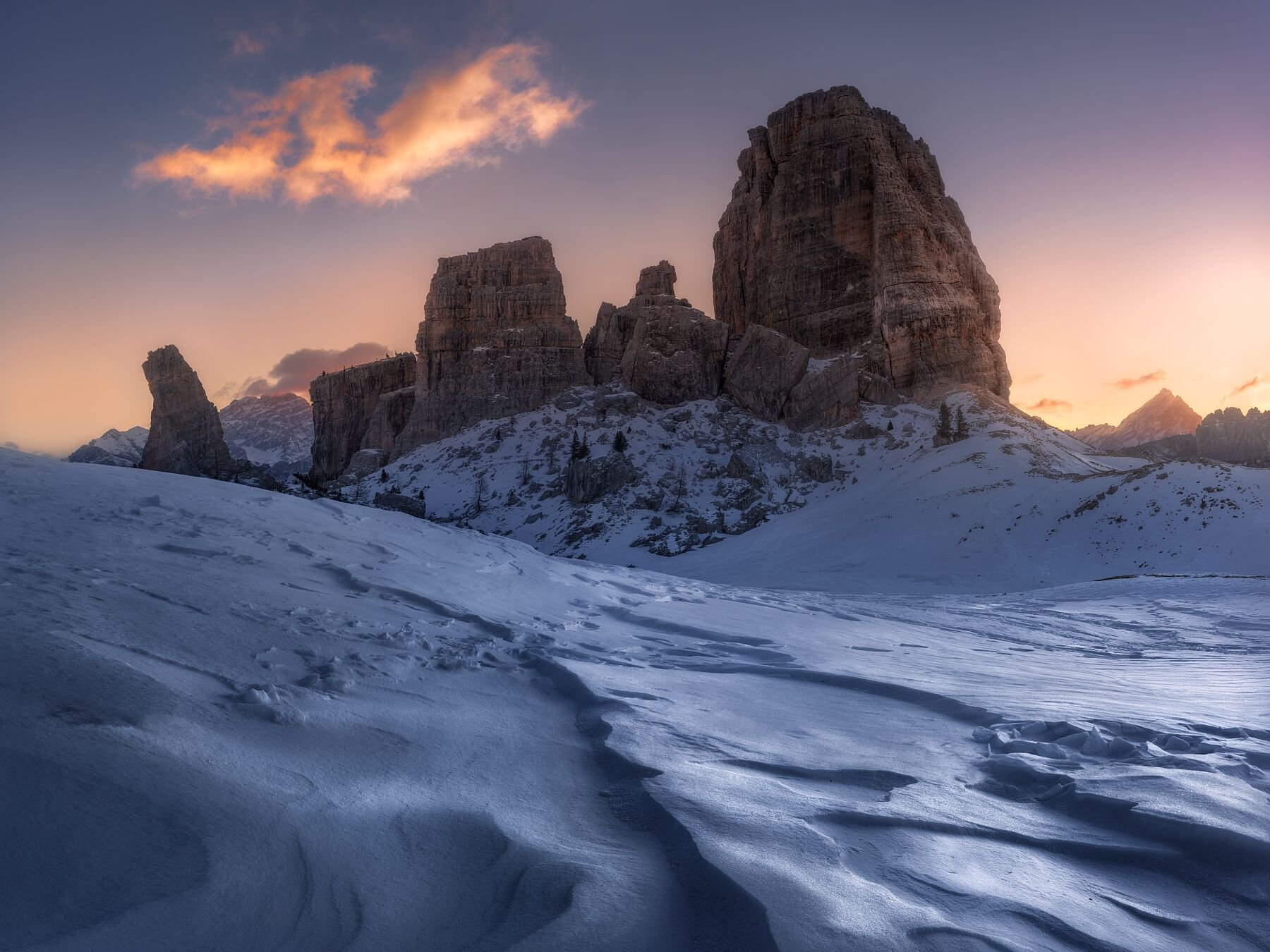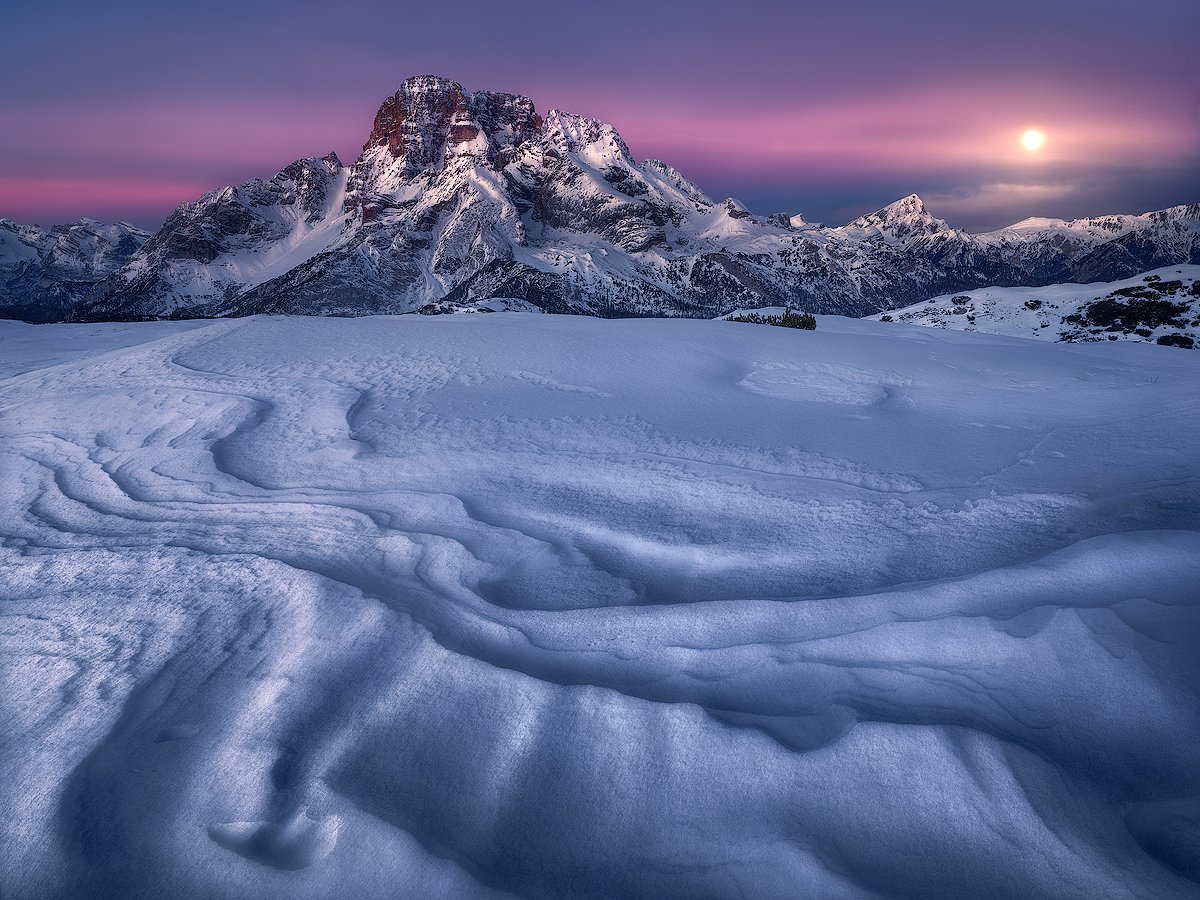Winter in the Dolomites: my favorite 10 spots
Winter in the Dolomites is still out there, as we are still at the end of January. The magical Winter wonderlands and snowy peaks are among the most amazing scenes in the World.
I’ve spent years capturing the beauty of the Italian Dolomites with my camera and saw these epic sharp peaks in all the seasons.I love the colors in a landscape but sometimes I feel a peaceful sensation in winter landscapes too. In this blog post I’ll tell you something more about my favorite 10 spots for a lovely Winter in the Dolomites. Keep in consideration that this is not a chart but just a list of my favorite Winter spots.
Alpe di Siusi
View of the Sassolungo group in a December night.
Alpe di Siusi or Seiser Alm, is the biggest plateau in Europe. It’s located at an altitude of 1680 m.a.s.l, surrounded by the incredible Sassolungo group, Catinaccio and the Sciliar massif (2563 m).
I always considered Alpe di Siusi as a huge creative space for my photography and even a place where to hike, enjoy nature and peace.
It’s a popular spot but it’s so big (57 kmq) that it’s possible to find several spaces where you can enjoy your beautiful loneliness, take pictures or walk without not so many people around.
In Winter, Alpe di Siusi is a paradise for skiers and cross-country skiing lovers.
You can click here to view a map of the pistes you can find there.
How to visit Alpe di Siusi
You can drive just to Compatsch (the town in Alpe di Siusi) by car just before 9 am and after 5 pm during the tourist season.
The winter season starts in the middle of December and ends at the end of March. The summer season starts in the middle of June and ends at the end of September.
Outside these periods you can drive up to Alpe di Siusi at any time because there are no cable cars working.
You can’t drive on the roads after Compatsch unless you have to drive to one of the hotels where you’re staying inside the natural park.
If you booked a room in a hotel on the plateau after Compatsch, you need to register your car number in the information point in San Valentino (on the right of the road if you come from Castelrotto), before driving up to Alpe di Siusi.
Alpe di Siusi during a Winter Sunrise.
Lago di Braies
Lake Braies is a very famous spot in the Dolomites of Val Pusteria. For sure you know it thanks to the typical Instagram images with the people rowing the boat in the turquoise water.
Of course it’s possible to admire the incredible color of the lake Braies just since the end of May because in Winter it’s frozen. But let’s see why can be a lovely location also in Winter, and exactly when.
Lago di Braies at the end of Winter, during snowy days.
Visit Lago Di Braies during Winter in the Dolomites
During Winter in the Dolomites, the best period to visit Braies is at the beginning of December and in the middle of April, at the beginning and at the end of Winter.
During these periods, the ice is less strong and on the shore of the lake there could be some interesting cracks and small ice bubbles under the ice surface. Or there should be some areas without ice.
I recommend you to not visit lago di Braies when there are so many people walking around, better during the early morning.
Cinque Torri
Cinque Torri is a very interesting mountain group. Its name means Five Towers because they literally look like towers of a small castle.
Usually they are visited in Summer but they look wonderful also during winter in the Dolomites.
Cinque Torri during a windy day.
HOW TO VISIT CINQUE TORRI
Cinque Torri can be reached by car from Cortina, driving in the direction of Passo Falzarego.
You will have to park on the Passo Falzarego 3 parking and take the chairlift to the Rifugio Scoiattoli, the mountain hut in front of the Cinque Torri.
You can also drive to Rifugio Cinque Torri, behind the Cinque Torri and hike from there with the snowshoes. But the road to the Cinque Torri hut is really narrow and probably full of ice in Winter.
Rifugio Lagazuoi
Rifugio Lagazuoi is an alpine hut at 2752 m.a.s.l. It has a huge terrace with a breathtaking view on the surrounding mountains like Marmolada, Pelmo, Antelao but also other distant summits.
View of the Dolomites from Rifugio Lagazuoi.
The most spectacular weather condition is the “sea of clouds”, when the top of Lagazuoi is taller than the clouds. In that situation the peaks look like islands. Lagazuoi hut is open from December to the end of March during Winter. It’s possible to reach the hut with the cable car from Passo Falzarego.
Cinque Torri over the sea of clouds. View from Lagazuoi.
Passo delle Erbe
Passo delle Erbe (it means pass of the grass) is one of the mountain passes which are open in a cold Winter in the Dolomites. The altitude of this pass is 2006 m.
During Winter, Passo delle Erbe is just reachable from Val Badia and not from Val di Funes.The most impressive thing about this spot is the Peitlerkofel, also named as Sas de Putia, a huge peak leading the valley.
Prato Piazza
Prato Piazza, also named Plätzwiese, is a mountain pass between Braies and Carbonin.
Croda Rossa and the Moon during the sunrise.
It’s possible to reach this spot by car and, from December 25 2021 to March 31 2022 you have to take the bus from Ponticello parking.
At this link you can find the time table of the bus. When you arrive at Prato Piazza, you can hike to Monte Specie or Picco di Villandro, where you can admire the famous Tre Cime di Lavaredo from far away.
Prato Piazza is surrounded by the majestic Croda Rossa and, further away, by Cristallo, one of the most beautiful mountains in the Dolomites. I suggest you bring the snowshoes with you to hike better, especially if there is a lot of snow.
Passo Sella
Passo Sella is another mountain pass which is opened during the Winter season, unless there is not a huge amount of snow and bad weather.
Sella mountain group in Sella Pass.
It’s a very well known ski station, with a lot of skiing facilities, but it’s possible to enjoy this spot even if you drive there and walk admiring the view.
Passo Sella is surrounded by Sassolungo group and Sella Group and you can see several peaks from Val Gardena and Val di Fassa from far away.
Passo Gardena
Close to Passo Sella is Passo Gardena, a pass connecting Val Gardena with Val Badia. I think it’s one of the mountain passes with the most impressive Dolomitic peaks around it and it’s a quite big area.
Sella and Sassolungo mountains from Passo Gardena.
During Summer it’s possible to start the best hikes in the Dolomites in my opinion, during Winter you can ski or enjoy the view of huge mountains like Sella Group, Cir group and Sassolungo.
Seceda
One of the most incredible sceneries in the Dolomites is for sure Seceda where you can admire the epic oblique summits. In Winter, you can reach the top of Seceda with the cable car from Ortisei. The cable car is open from 8.30 am to 5:30 pm.
Val di Funes
From the top of Seceda you can see Val di Funes from above. Santa Magdalena is the most picturesque town in this valley and you can admire the most famous view of it under the Odle group (Seceda is part of this group).
Santa Magdalena Val di Funes and the Odle mountains behind.
You have to park the car in the town and hike down Magdalenaweg to reach the famous point of view of Santa Magdalena under the Odle group. Another view is the little San Giovanni in Ranui church. From there you can even hike to Geisleralm with the snowshoes.











